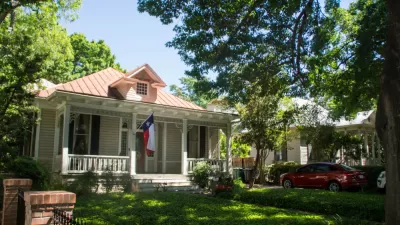Neighborhood registration and accessory dwelling units are among the hot button items included in a package of 193 proposed amendments to the San Antonio Unified Development Code.

San Antonio has spent the year considering 193 amendments to its unified development code, with a City Council committee hearing on the changes held last week and a full council vote expected in October.
“On Thursday, the committee learned that of all proposed changes, city staff only recommended two be denied: one from the San Antonio Archdiocese that would allow transitional housing in residential areas; the other from the Government Hill Community Association, seeking to change the city’s neighborhood registration process,” reports Iris Dimmick for the San Antonio Report.
Much of the controversy surrounding the entire package of amendments focuses on the neighborhood registration process, according to the article. Rose Hill, president of the Government Hill Alliance, is paraphrased in the article saying that the amendment is an attempt to undermine the alliance.
“Other proposed amendments would affect accessory dwelling units, flood prevention, urban farms, light pollution, short-term rentals, historic preservation administration, the location of gas stations, tree preservation and building height limits,” according to Dimmick.
Councilmember John Courage is quoted in the article saying that the new ADU rules are likely to attract public attention in the final rounds of hearings, too. According to Dimmick, the amendment will eliminate a rule that an ADU’s utilities must be connected to the primary structure, remove occupancy and bedroom limitations, and loosen design requirements and allow for larger units. “[ADUs] would be limited to backyards, and be capped at two stories. Only ADUs with floor areas larger than 800 square feet would be required to provide parking.”
FULL STORY: From casitas to communication: 193 development rule changes head to City Council

Alabama: Trump Terminates Settlements for Black Communities Harmed By Raw Sewage
Trump deemed the landmark civil rights agreement “illegal DEI and environmental justice policy.”

Planetizen Federal Action Tracker
A weekly monitor of how Trump’s orders and actions are impacting planners and planning in America.

Why Should We Subsidize Public Transportation?
Many public transit agencies face financial stress due to rising costs, declining fare revenue, and declining subsidies. Transit advocates must provide a strong business case for increasing public transit funding.

Judge Orders Release of Frozen IRA, IIJA Funding
The decision is a victory for environmental groups who charged that freezing funds for critical infrastructure and disaster response programs caused “real and irreparable harm” to communities.

‘Clybourne Park’ Sets Stage for Housing Equity Discussions
Clybourne Park, a play exploring race, real estate, and community tensions, can set the stage for discussion on the lasting impacts of housing discrimination, gentrification, and the fight for affordability.

Understanding Road Diets
An explainer from Momentum highlights the advantages of reducing vehicle lanes in favor of more bike, transit, and pedestrian infrastructure.
Urban Design for Planners 1: Software Tools
This six-course series explores essential urban design concepts using open source software and equips planners with the tools they need to participate fully in the urban design process.
Planning for Universal Design
Learn the tools for implementing Universal Design in planning regulations.
Caltrans
Smith Gee Studio
Institute for Housing and Urban Development Studies (IHS)
City of Grandview
Harvard GSD Executive Education
Toledo-Lucas County Plan Commissions
Salt Lake City
NYU Wagner Graduate School of Public Service





























